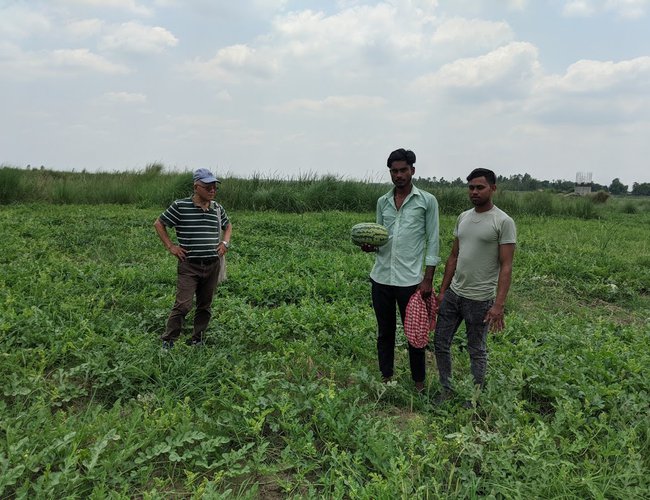
In the past decade, foreign countries were the main destination for the youth in Mandal Tole Kankai Municipality ward 6 of Jhapa district and the rural areas of Rangeli, Morang and Kanchanpur.
However, with the advent of RBF and the subsequent increase in income, there has been a noticeable return of youth from Mandal Basti, Rangeli and Kanchanpur who are now engaged in river farming.
With income from RBF surpassing that from overseas countries such as Malaysia and the Middle East, families are now more inclined to keep their youth and invest in the agricultural sector, particularly river farming and vegetable production.
"It has become clear that there is no need for young people to seek employment abroad. My two sons returned from Malaysia two years ago and found that their earnings here were significantly higher than in Malaysia," said fifty-five-year-old Vidhya Mandal. "We now want more young people to contribute to the agricultural sector here to promote the expansion and growth of riverine and vegetable farming."
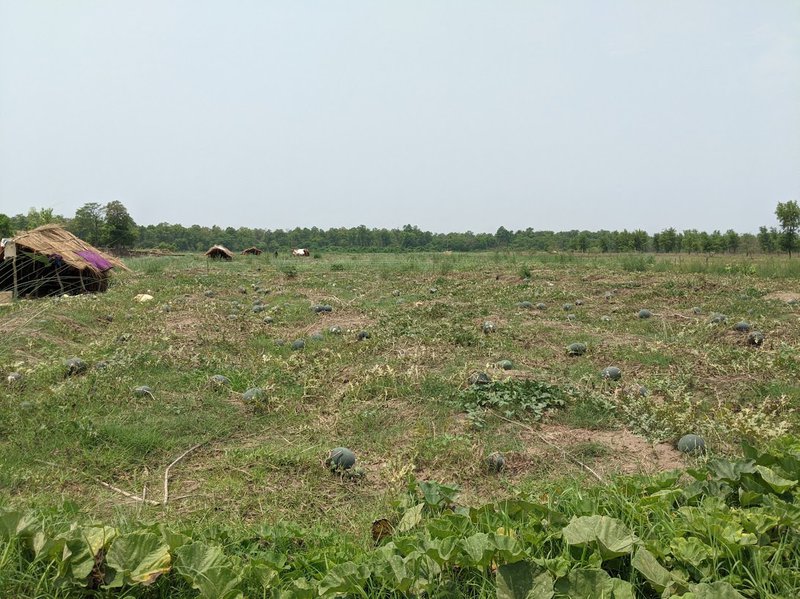
Despite the continuing trend of young people in the villages of Rangeli in Morang seeking employment abroad, there is a noticeable decline in this practice. The superior income potential of RBF and vegetable farming has led to a shift in preference, making these local industries the first choice for many youth.
Chetan Mandal, 65, of Rangeli Municipality Ward No. 6 Rangeli, who led a group to establish the RBF Group in 2014 and is now retired, is ecstatic about the situation. His eldest son, Dhiraj Kumar Mandal, 28, is now fully dedicated to RBF and vegetable farming, choosing to stay in Nepal rather than work in the Gulf.
Mandal has faced many challenges throughout his life, but sees himself as a pioneer in RBF who has earned recognition and respect. "When the opportunity to earn more money at home becomes available, it seems natural for individuals to make that choice. My son is now taking the lead," said Chetan Mandal.
Local Resource Person Janardan Mandal, a resident of Mandal Basti, Kankai of Municipality Ward 6 of Jhpa District, shared that about 22 youths after returning from Gulf countries and Malaysia have never returned to these countries. All of them are now engaged and earning good income from RBF.
Dhiraj Kumar Mandal, the eldest son of Chetan Mandal, has been operating on 20 kathas of land on the banks of Bakhara and Kisan rivers and has also leased two bighas (one bigha equals 1.65 acres) of private land at an additional rent of Rs. 20,000.00 per bigha.
"Our location near Hulaki Rajmarg offers us a wide market, with vegetables being sold even in the Rangeli bazaar and in a nearby Indian border town. However, we have to travel to Biratnagar to sell watermelons due to the high demand," said Mandal.
"In the youth group, I am one of ten others who have joined the RbF project. Our group used to work successfully, but it has become dysfunctional. At present, 50 households are involved in farming along the riverbed," said Chetan.
As trained LRPs, members of the first group, along with other farmers, continue to seek guidance from the senior mandal on agricultural matters, including crop selection, seed types, fertilizers, and recommendations for pesticide use against insects.
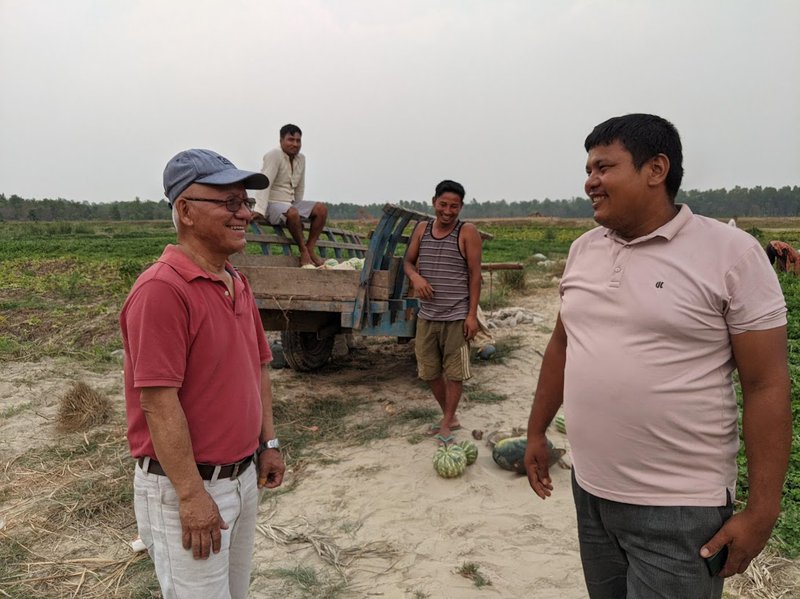
Hari Gurung With Balbir Chaudhary (left)
"This year, our crops along the riverbed, especially in the sandy areas, were severely affected by new insects. Many villages came to my father for advice. Now there are about 50 youths, most of them returning migrants, engaged in agriculture," Mandal said.
Mandal mentioned that migrants are engaged in agriculture. This trend is not limited to Koshi province, as youth in Sudur Paschim are also opting for RBF instead of foreign employment.
For example, LRP Balbir Chaudhary from Kanchanpur district in Sudur Paschim province stated that about 45 youth in 3 groups have decided not to seek foreign employment as they find satisfaction in the income generated from RBF and vegetable production in their kitchen gardens.
Chaudhary added that the young people are earning around Rs.300,000 (USD 2000) per year in their hometowns, eliminating the need to go abroad.
"Helvetas-Nepal provided us with support, such as seeds and equipment, and liaised with the municipality and the district agriculture office. After the Helvetas-Nepal project ended, we did not receive any support from the municipality," says Chaudhary.
“I am able to cover the monthly school fees of Rs.4000.00 (USD 30) for my two sons, who are studying in an English Boarding School, as well as their bus, books, attire, and family household expenses, despite having a large family of 11 individuals.”
“Due to income from RBF, I am not worried about the monthly school fees for my children or the household expenses. As I am expanding my farm beyond the riverbank, my earnings are set to increase.”
Challenges
Riverbed farming, however, comes with its own set of risks. Rain and flooding can damage our crops. “Last year, I had to harvest my watermelons a week earlier than usual due to a flash flood in the river on May 18. This resulted in a loss of around Rs.15, 000.00 (USD 120).”
Tanaka Acharya, an agriculture technical officer in RBF project under Forum For Rural Welfare and Agriculture Reform for Rural Development (FORWARD NEPAL), a national NGO and local partner of Helvetas-Nepal, mentioned that more than 500 youths who were previously aspiring for foreign employment and over 200 returnees are involved in RBF in Morang and Jhapa district. He also stated that there is potential to engage even more youth with the necessary technical and other support.
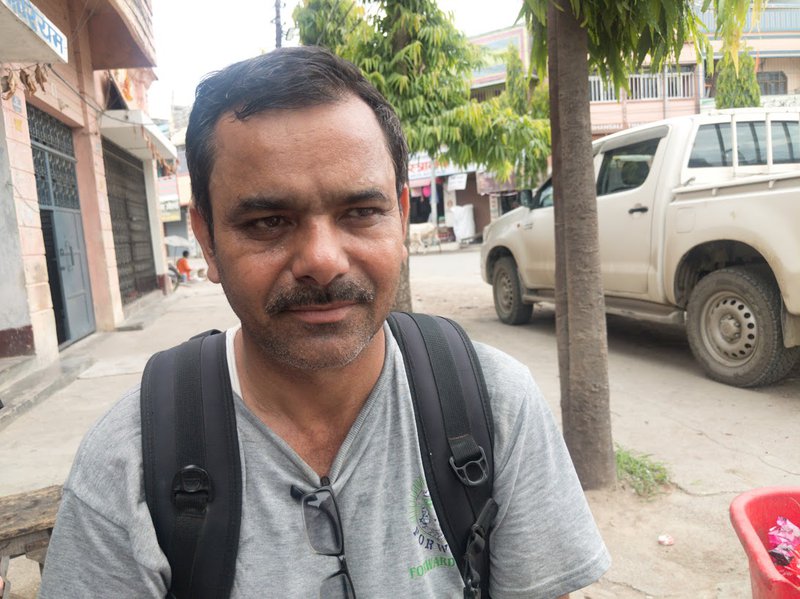
Tanka Acharya
To mitigate these risks, many farmers are now renting more land for vegetable cultivation. Previously, I managed just 3 Katths of land on my own, but last year, I leased out 2 bighas of land.
I have also hired one individual on a monthly salary of Rs.12, 000.00 (USD 900). I find the need for someone to be employed throughout the year.
With the new rented land, I am now cultivating on 2.5 bigahs and 20 Katths by the riverbank. My current crop includes Bottle Gourd (Lauka), Tite Karela Bitter gourd), Cucumber, Pumpkin, Beans, Brinjal, Watermelon, and various others.
Farmers from our group, on average, earn a net profit of Rs.25,000.00 (USD 200) per season for cultivating 1 Kattha of land. With a successful harvest, an individual can earn around Rs.300,000.00 (USD 2,200) per year.
The income from our crops is largely dependent on crop quality. If the crops are free from insects/pest and look healthy, it means a good yield. My last harvest was very successful, and I managed to earn Rs.30,000.00 (USD 2,500) from 10 Kattha of crops by the river.”
In 2013, when Helvetas Nepal initiated efforts to promote river bed agriculture, it was a novel concept with a small number of participants and ample riverbanks available for cultivation. The early successes of those who started farming in the riverbeds drew more individuals to adopt this method of agriculture.
However, as more people became interested, the available land on the riverbed farming of Lunia and Lohana rivers became increasingly scarce. Previously, individuals were growing vegetables on as much as 2 bighas of land, but now, many have reported having to farm on just 1 to 10 hectares. For instance, Mandal, who has 10 hectares of land himself and his father has an additional 10, had to rent out 3 hectares of private land to continue his vegetable farming operation.
The allure of river bed agriculture continues to grow due to the lucrative income it offers. Unfortunately, the introduction of new insect infestations has significantly impacted crop production.
Despite these challenges, the attractiveness of riverbed farming remains, thanks to the profitable nature of the practice. This year alone, scores of returnee youth have leased land on nearby riverbanks to grow vegetables and watermelons, earning as much as much as they earned in foreign employment.
The Riverbed Farming Project was once a prominent initiative of Helvetas-Nepal. As Nepal grapples with youth unemployment and a significant number of young people seek opportunities abroad, Dr. Prabin Manandhar, Country Director of Helvetas-Nepal, believes that promoting RBF is an ideal strategy to retain and engage youth.
This success story is particularly noteworthy given that around 450,000 Nepalese return from abroad each year, seeking a more stable life and economic security in their homeland. The areas of Kankai and Rangeli have emerged as key sites for reintegration, offering these returnee migrants the opportunity to use their skills and income in the agricultural sector, particularly riverbed farming.
This project, originally started by Helvetas Nepal 16-17 years ago by Indian migrant farmers in Sudur Paschim, was Nepal's first attempt to formalize and institutionalize River Bed Farming (RbF) in 2006. Starting with a trial involving 670 families in 2006, the initiative has expanded to cover 10,000 households in the districts of Kailali and Kanchanpur in the far west of Nepal and other terai districts of Nepal - now within the federal system of Sudur Paschim Province.
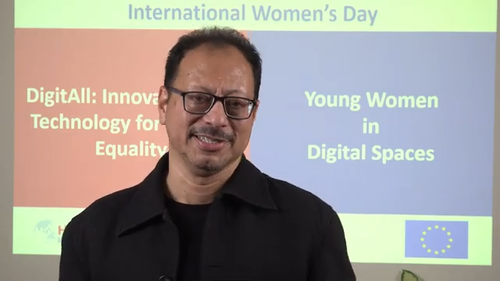
Dr. Prabin Manandhar
The agreement to lease the riverbeds has also been extended to include privately owned land and other entities such as community forest user groups. By the end of 2013, Helvetas had reached 4462 households that are landless, land-poor or affected by frequent flooding, with a target of nearly 7900 households by 2018, with 50% of the participants being women.
The Helvetas Nepal team, led by Hari Gurung, who is in charge of the Riverbed Farming Project, first came up with the idea of persuading local authorities, including Village Development Committees (VDCs) and District Development Committees (DDCs), to lease public land to landless or land-poor families, allowing them to grow vegetables during different seasons for a fixed period of time," said Hari Gurung. This initiative began in Sudur Paschim Province and has since become a critical lifeline for many families with no or limited access to land, covering 21 districts in the Terai and Madhesh regions.
The involvement of returning migrants as well as hopeful young migrants has shown that riverbed farming is more than just a project that has helped certain impoverished households in the Terai to improve their way of life. It is, in fact, a project that aims to achieve Nepal's long-term goal of integrating more and more returnee migrants into the country and providing them with sustainable employment opportunities.

Keshab Poudel
Poudel is the editor of New Spotlight Magazine.
- ERC Nepal Is Focused On Expanding Distribution And Transmission To The Private Sector: ERC Chair Dr. Dhital
- Jul 06, 2025
- FOURTH PROFESSOR Y.N. KHANAL LECTURE: Nepal-China Relations
- Jun 23, 2025
- Colonel JP CROSS: Centenary Birthday
- Jun 23, 2025
- BEEN: Retrofitted For Green
- May 28, 2025
- GGGI has been promoting green growth in Nepal for a decade: Dr. Malle Fofana
- May 21, 2025















